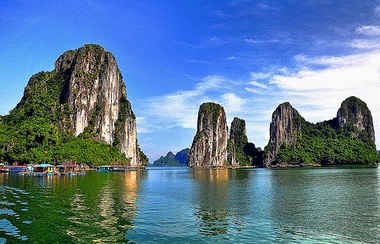Halong Bay's name refers to a dragon that descends, and it has
long been a site of mythic significance to the Vietnamese. Dragons have long
been sacred to the Vietnamese, who believe that they are descended from the
union of the dragon god Lac Long Quan and a beautiful goddess of the mountain,
Au Co.
 Similar legends abound about the creation of
Halong Bay. One ancient story tells
of a powerful dragon that flew from the mountain to the sea, its fiery tail
carving out valleys and gorges, before it dived into the sea. The splash caused
the sea to flood the landscape, leaving only the tips of the hills peaking out
as islands.
Similar legends abound about the creation of
Halong Bay. One ancient story tells
of a powerful dragon that flew from the mountain to the sea, its fiery tail
carving out valleys and gorges, before it dived into the sea. The splash caused
the sea to flood the landscape, leaving only the tips of the hills peaking out
as islands.
Another recounts the tale of the early Vietnamese fending off invaders who came
by sea. To help them, gods dispatched a mother dragon and her young, who started
spitting out pearls from their mouths. These pearls turned into the islands and
pillars that jutted out from the sea, blocking off the passage of the ships.
Whatever the story is, Halong Bay clearly emerges as a very special place unlike
any other. And in fact, researchers and scientists have found that Halong was
one of the earliest cradles of civilisation in Vietnam, thanks to its rich
biological diversity of rainforests, mangroves and coral that supported
vegetation and animals, making it a good place for ancient humans to live.
Evidence of many ancient cultures and Vietnamese ethnicities have been
discovered here, like the Soi Nhu, Cái Bèo and Halong culture, all which date
far before 1500 B.C.
In Vietnam's history, Halong Bay is also an important place. It is the home of
the historical port Van Don, and a place where heroic ship battles took place to
protect Vietnam against foreign invaders. It was here on Bach Dang River that
General Tran Hung Dao planted sharp wood stakes in the water during a Mongol
attack. These stakes punctured the hulls of Kublai Khan's ships, causing them to
sink in the river. In this clever way, the general kept his people safe from the
relentless attacks of the Mongol army.
Culturally, Halong Bay is also very important as a place that inspired artists,
poets and scholars who shaped Vietnamese culture and history. Poem Mountain is
covered with carvings of poems celebrating famous Kings and legendary heroes and
warriors. The famous scholar Nguyen Trai also immortalized Halong Bay in his
poetry as a wonder of Vietnam.
Today, Halong Bay is inhabited by fishing families, numbering to about 1,600
across four floating villages located in quiet coves. These villages are
centuries-old, lived in by generations of fisherman, who have never left Halong
Bay, but enjoyed the protection of the mountainous isles from storms and rough
weather. In this world, young children swim before they learn to walk, and at an
early age, they start to steer and row their own little boats, made of bamboo
baskets.